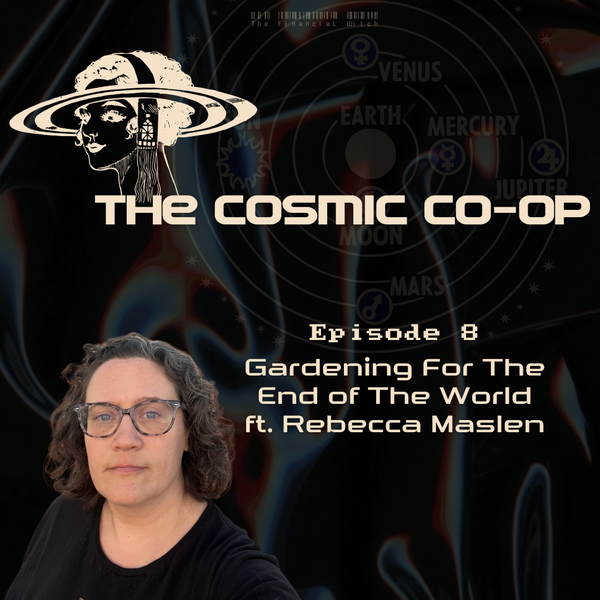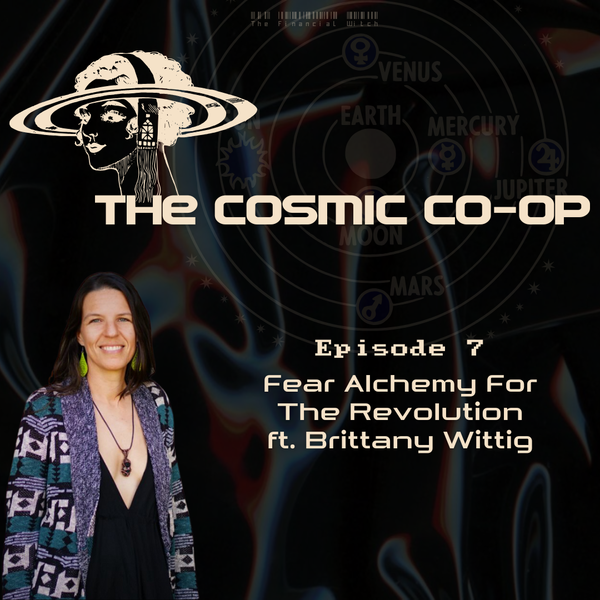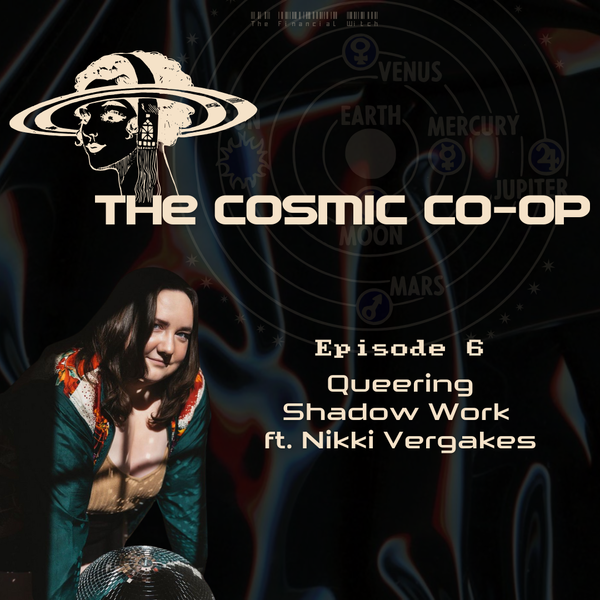Axe in Hand: Aries I and the art of micro-disruption
Part 1 of an eclipse season series on weaponizing time

After the new moon in Pisces yesterday, we have begun the slow slide into the first eclipse season of 2025. There’s also a mass protest in the form of an economic blackout happening today, which is bringing this idea of economic disruption to the forefront for many. Eclipses have long been harbingers of upheaval, destabilization, economic crashes, assassinations, coups, and radical shifts. Given the current political climate, it's safe to assume this eclipse season will be no different. The question is: how do we the people weaponize this time?
I personally feel we aren’t talking enough about how to wield astrology as a tool to combat oppressive forces. We talk a LOT about how astrology reflects the oppressive movements we are facing, but we could be a lot more subversive with it. I want to see more folks weaponizing time basically
— Sam | Anti-Capitalist Astrologer (@thefinancialwitch.bsky.social) February 21, 2025 at 1:21 PM
[image or embed]
Eclipse season, as a semi-annual cosmic rupture point, offers the perfect moment to interrupt cycles of power. The goal is to cultivate a sustained practice of micro-disruptions: daily, intentional choices that withdraw power from capitalist structures and redirect it toward collective autonomy.
Whatever happens to the sun and the moon during eclipse season is part of the eclipse story. As Venus stations retrograde in early Aries on March 2nd, the Moon comes to join her shortly after, illuminating Venus’ struggles in this decan and pointing to this storyline as a main feature of the next couple of lunations. The first decan of Aries is represented by an axe, and Austin Coppock writes, “The axe is the primordial splitter, the first and still best tool for creating two out of one. Life, on all levels, requires this division for growth.” (Coppock, 36 Faces, p. 53).
The sickening paradox of capitalism is that it demands unending growth—something both unnatural in the laws of our planet and impossible given our finite resources—while simultaneously promoting widespread death, destruction, and mutation, much like a cancer. Cancer cells mutate; that’s why our grocery store bananas no longer have seeds. Capitalism aided in mutating them to a heartier, more drought-resistant variety which can be more easily transported across the globe and doesn't produce seeds, effectively (whether intentionally or not) ensuring we ourselves, the consumers, couldn’t seize the means of banana production. Sounds silly, but it’s true.
Coppock further elaborates, “The axe may be the tool by which the individual liberates themselves from the collective, but it is also the cruel weapon of the primordial mother as castrator, the limiting force with which the warlike figures of this decan wrestle.” (p. 54). This reflects capitalism’s paradoxical nature: it can provide opportunities for upward social mobility and financial prosperity while simultaneously propagating death, exploitation, and poverty. Many hesitate to fully embrace anti-capitalism because capitalist realism has made it difficult to imagine a world beyond this one. A familiar hell over an unfamiliar heaven keeps us trapped, mirroring the discomfort Venus and the Moon experience in this decan of Aries. Coppock describes Venus as being able to “offer little connective or reconciliatory power” in this space, and the Moon as “finding herself in an awkward position” here as well.
Capitalism requires constant participation at every level because it is a system that depends on continuous economic activity, data collection, and labor extraction to sustain itself.
Unlike past economic systems that relied on seasonal work or fixed production cycles, modern capitalism demands infinite growth—something that can only be maintained if people are constantly engaging, spending, producing, and being surveilled. The system cannot survive if people stop spending, which is why economic blackout protests feel accessible even to those who are otherwise politically disengaged. If consumers pause their spending, markets panic, stock prices drop, and businesses begin cutting jobs to preserve their bottom line. Sounds like an incredibly robust economic system with deep roots and stable branches, doesn’t it? /s
Even your attention is a product in the age of digital advertising. You don’t have to make a purchase to benefit some faceless corporation; your scrolling, liking, and commenting are commodities. Your eyeballs and your time are the product, and though you may give them over for free, that doesn’t mean there aren’t long-term costs. Ad revenue is only reliable when engagement is predictable, so unpredictability is key to destabilizing the attention economy. Likewise, both paid and unpaid labor feed capitalism. Most paid labor under capitalism is extracted for someone else’s profit, and unpaid labor (childcare, housework, emotional support, community work, creative practices) provides necessary structural support to society without compensation.
Mark Fisher, in Capitalist Realism: Is There No Alternative?, argues that capitalism presents itself as the only viable economic and social system, making it seem permanent and inevitable. He describes this phenomenon as capitalist realism, a pervasive belief that not only is capitalism the only system that works, but that imagining a world beyond it is nearly impossible. This is the foundation of TINA (There Is No Alternative). Therefore, simply believing in an alternative to capitalism is a radical act, but belief alone is not enough. Capitalism is always actively working to undermine resistance and critique to ensure its permanence.
Ismatu Gwendolyn expands on this hesitancy, writing, “Radical, in political use, means to depart significantly from the systems we have in place. It means you have the intent to transform or replace fundamental elements in society and position yourself to do so—much like a radical electron, in science, can change the basic composition of an atom by adhering to a different system. You can tell pretty easily if something is radical because it will meet significant institutional pushback. The systems we have in place are engrained because everyone participates; someone refusing to participate and actively creating a new thing also creates an open threat to the system we have in place. Radicalism that’s detected by our overarching system is met with pushback.”
This ties directly into the way capitalism co-opts radical ideas and defangs them, reinforcing the spectacle economy. Kendrick Lamar’s recent Super Bowl performance is a case in point: a sharp, politically charged artist whose early work offered scathing critiques of racial capitalism is now a centerpiece of a corporate spectacle. Gwendolyn critiques this dynamic: “The conversations that we have online remain cyclical because we have no political teeth with which to chew and swallow our food. We move like cattle chompin' cud. ‘Are these people making propaganda? Are our Black MegaStars championing the US empire?’ …Yes. Of course they are. Their excellence within their craft, nor their very authentic Blackness, does not erase their liberalism. In fact, it makes their liberalism even more insidious.”
Capitalism thrives on the ability to absorb rebellion and repackage it as spectacle. Black squares, pink pussy hats, Nike co-opting Kaepernick’s protest while pacifying any real disruption to the NFL’s bottom line—these are all examples of capitalism absorbing critique and selling it back to us as a product. The system thrives not by stamping out resistance entirely, but by allowing just enough of it to exist in a commodified form, rendering it impotent. The goal is not to destroy radical ideas outright but to make them profitable and toothless.
Coppock notes of Aries I, “May be tapped in order to sever contacts and break bonds which no longer serve. One might also direct this force to a portion of their environment which is out of control. There is a power to bring subjective order to the world here—to chop down trees, to cut a path through the jungle… the raw power which burns here can also be turned on an enemy to dire effect.” (p. 55). This is the crux of what you can do to weaponize this specific time and these specific transits. To dismantle a system like capitalism, which posits itself as foundational to the way the world functions, will require raw power and the bravery to enact force upon the circumstances that feel out of your control. It’s not about convincing yourself these things can be brought under your control; it’s about taking an axe to them and chopping them down. Get rid of them entirely. Clear the path.
When radical ideas become trendy (AKA profitable), they lose their disruptive potential. The best way to prevent co-optation is through sustained, small, daily economic disruptions. They are difficult to commodify and operate outside of capitalism’s spectacle machine. Rather than overwhelming yourself with too many changes, pick one or two micro-disruptions to implement consistently, not just during eclipse season. Track how it feels to withdraw participation and notice the resistance that arises, both internally and externally.
- Commit to no-buy days: Instead of just participating in a one-day economic blackout, commit to one no-buy day per week. The key is consistency, not just a single event.
- Move your money: If shifting entirely to a credit union or cooperative bank isn’t feasible, start small: transfer just 5% of your funds to an ethical institution or withdraw cash and use it instead of digital transactions to disrupt financial tracking.
- Unsubscribe from capitalism: Each day of eclipse season, unsubscribe from one corporate newsletter, delete one unnecessary account, or cancel one subscription that’s leaking money from your wallet.
- Ghost the algorithm: Disrupt targeted advertising and data tracking by searching for random, unrelated items, clicking fake interests, or using privacy-focused browsers. The less predictable (or available) your data is, the less valuable it becomes to the system.
- Work slowdowns: If you can’t strike, you can still refuse urgency. Deliberately delay non-essential tasks, push back against unrealistic timelines, throw wrenches in discriminatory bureaucratic processes, and resist unpaid labor creep by refusing to take on work which falls outside of your stated job description.
- Mutual aid micro-actions: Each week or month, redirect a small amount of your money, time, or skills toward mutual aid efforts. This can be so small, like offering to make phone calls on behalf of someone else, or giving rides to your community. Don't overwhelm yourself thinking you have to give up the things you actually need to survive.
- Start tracking your “capitalist fatigue” patterns: When are you most inclined to impulse spend, work beyond your energy, or engage in extractive systems? Don't engage with this prompt as a way to shame yourself; just collect the data and see what you notice.
Venus, though uncomfortable in Aries, is still powerful. Coppock writes, “In this harsh decan, Venus can offer little connective or reconciliatory power. When her gorgeous light pours through it, she illuminates figures of raw potency. There is thus a halo of glory here.” (p. 57). The war-like qualities of Venus are often overlooked, especially in her detriment. The halo of glory may be stained with blood and dirt, but she stands at a threshold—between the battle to bring the old world to an end and the battle to birth a new one.
This is just the beginning. Eclipse season offers a rare opportunity to disrupt entrenched systems, not just in theory but in practice. In the coming pieces, we’ll continue to explore concrete methods of economic resistance, ways to untangle personal identity from capitalist conditioning, and strategies for sustaining meaningful disruption beyond eclipse season. Now is the time to carve a path through the overgrowth. The axe is in your hands.
Thank you for reading!
Your ongoing support makes it possible to continue writing, podcasting, & offering more sliding scale and no-cost offerings in the future. To become a Cosmic Co-Op member, click here.
Share this publication: like, comment, reply, or link me on your social media! I love to receive thoughtful feedback and continue conversations beyond this platform--especially in our community Discord server.
If you would like to pay for a subscription, but don’t want to do so through Ghost, you can pay via my Venmo. If you’d like a paid subscription, but can’t afford it, please reach out to me and I’ll add you—no questions asked.




